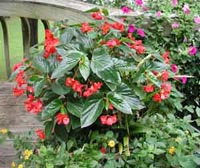Resource Library
Plant of the Week: Dragonwing Begonia
The University of Arkansas System Division of Agriculture does not promote, support or recommend plants featured in "Plant of the Week." Please consult your local Extension office for plants suitable for your region.
Plant of the Week
Dragon Wings Begonia
Latin: Begonia x hybrida 'Dragon Wings'

In 35-plus years following the comings and goings of horticulture, I've seen a number of plants rise in popularity, only to be dashed against the rocks as gardeners tire of them or their less desirable attributes become known.
Dragon Wings begonia is one of the most remarkable new garden flowers to come along in my career. It too will eventually fade from the scene, but for now it's an excellent example of another group of garden plants – the interspecific hybrids – as we continue our discussion of how garden plants are produced.
Dragon Wings begonia is a 2- to 3-foot tall, cane-forming begonia with deep, glossy-green, 5-inch long leaves and drooping clusters of flowers. Because the hybrid is sterile, it just keeps blooming from spring till frost. The original introduction had bright red flowers but pink and white forms are now available.
My only complaint with Dragon Wings is that it's a bit messy on my deck. It makes so many flowers that I have to occasionally sweep to keep it from staining the wood red.
To follow the story of Dragon Wings begonia, we must first discuss a bit of jargon. The plant is an interspecific hybrid (a cross between two species of begonia), so an "x" is used in the name to indicate its hybrid origins. While this has no legitimacy with begonia taxonomists, some sources are using the name Begonia x hybrida as a catchall name for this hybrid.
The name Dragon Wings is a bit confusing. Chatter amongst members of the American Begonia Society indicate that a plant was registered in 1985 and named Christmas Candy by Mable Cowin, a hobby breeder working with shrub type begonias. From photos on the web, Christmas Candy seems almost identical to what we call Dragon Wings begonia.
In 1992, Brad Thompson registered, with the American Begonia Society, a cane-forming hybrid and called it Dragon Wings. This foliage plant is completely different than the flowering plant we find in the trade with the same name. Thompson's contribution to the story seems to be coming up with a nifty, marketable name.
In 1997, the lawyers at Burpee registered a trademark, and Dragon Wings became Dragon Wings®, but for a different plant, a hybrid of Begonia U014 x, an unnamed B. semperflorens (wax begonia) cultivar. It's unclear if Cowin's Merry Christmas is the same cross as Burpee's Dragon Wings Red, but they're certainly very close. Dragon Wings seeds are produced by PanAmerican Seed Company, a division of the Ball Seed Company, which also owns Burpee. The company thought they had a hit on their hands so pulled out all the stops to promote the plant with greenhouse growers and gardeners.
Begonia U014 was a then unidentified cane-forming begonia from Argentina . Early on, it was suspected to be as a form of the Angel Wing Begonia ( B. coccinea ) but now appears to be a different species called B. descoleana that was identified in 1950 from material collected in Brazil .
To cross successfully, plants must have the same number of chromosomes and enough base pairs in common so that their DNA will match successfully. Dragon Wings apparently is a good match but not perfect.
Interspecific hybridization is a common way for breeders to introduce new traits into plants. If the hybrid is closely enough related to produce viable seeds in the F2 generation, the characteristics can be fixed using inbreeding techniques. If they're too distantly related to produce seed, as is the case here, they can be maintained as a hand pollinated F1 hybrid. If seed production is not the main means of reproduction, these interspecific hybrids can be propagated by cuttings.
Dragon Wings' sterility is good for both the gardener and the seed company. For the gardener, sterile plants never develop seeds and keep flowering in an unfruitful attempt to procreate. For the seed company, it's good, because the only way seeds can be produced is to make the cross by hand and harvest the seeds, thus guaranteeing a lock on the market for this unique plant. Because the seeds are costly to produce, they sell for about 10 cents each to wholesale growers.
Dragon Wings begonia, named an Arkansas Select plant in 2001, grows in sun or shade. It's usually not available until late spring in the garden centers, and then most growers offer it in larger container sizes. It's a big plant, so give it plenty of room.
Like all begonias it does best in fertile, well-drained but never dry, organic soil. To keep it growing throughout the summer, make sure it is fertilized with some regularity. Dragon Wings thrive on the heat and humidity of an Arkansas summer.
By: Gerald Klingaman, retired
Extension Horticulturist - Ornamentals
Extension News - August 27, 2004
The University of Arkansas System Division of Agriculture does not maintain lists of retail outlets where these plants can be purchased. Please check your local nursery or other retail outlets to ask about the availability of these plants for your growing area.